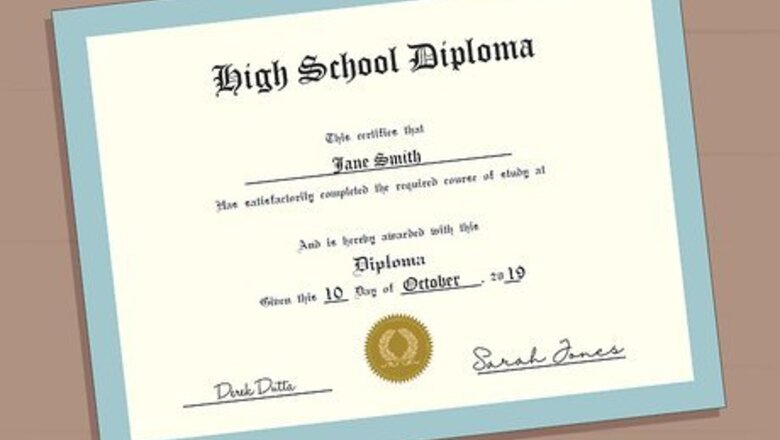
views
Getting the Proper Education and Certifications
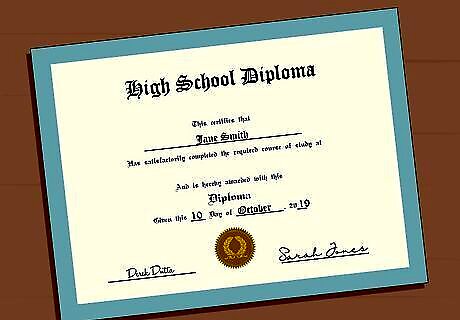
Receive a high school diploma or GED. If you’re still in school, focus on science courses so to help you move forward in the medical field. Try to take any advanced placement courses that are offered to help you earn college credits while you’re still in high school. If you haven’t earned your diploma and you’re out of school, look for general educational development, or GED, classes so you can earn a high school equivalency diploma. Many GED courses run at night so you can still work during the day while you earn it.
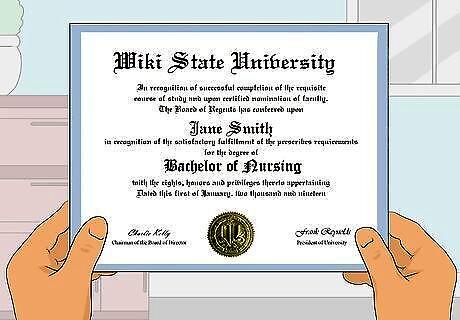
Earn your bachelor’s degree in nursing from an accredited school. Look for a school that’s approved by the Accreditation Commission for Education in Nursing (ACEN) or the Commission on Collegiate Nursing Education (CCNE) to ensure they meet professional standards. Pay close attention during your classes, labs, and clinic experiences, and take notes so you’re able to study from them. Focus on your studies while you’re in school and work hard to get the best grades that you possibly can. Take elective courses on teaching if you’re able to. Network with other students in your program so you can meet new people and make new friends in the medical field.
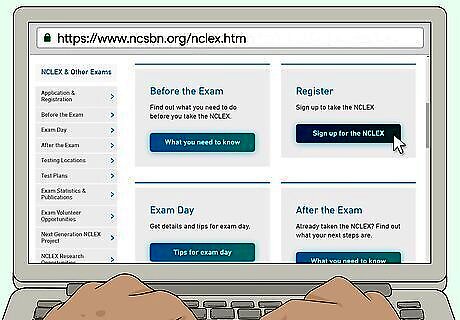
Take the licensing exam to become a registered nurse. After finishing your bachelor’s degree, sign up for the National Council Licensure Examination (NCLEX-RN) and select an exam date. Show up to the testing location on time and complete the licensure exam to the best of your ability. If you pass, you will receive your nursing license. If not, you can retake the exam after 45 days. You will have 6 hours to complete the NCLEX-RN, and it has a minimum of 75 questions and a maximum of 265. Look for practice exams online so you can study and see what you need to improve on.
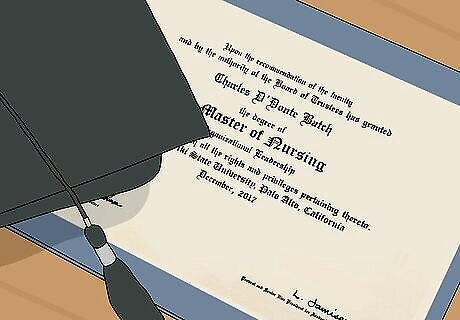
Get a master’s degree in nursing education to learn clinical teaching skills. Search for an accredited university that offers a master’s in nursing. When you apply, choose a program for a nurse educator or a clinical nurse specialist so you can get the most relevant experience. Focus well on your studies and any clinical duties you need to complete so you can graduate with the best grades. You can apply for a master’s program right after you finish your bachelor’s program or any time after you start working as an RN. Most clinical instructors need a master’s degree, but you may be able to find a position if you’ve only completed your bachelor’s program. You can also choose a night program for your master’s, but it usually takes 3–4 years to complete rather than 2.Tip: If you’re already a registered nurse and only earned an associate’s degree, you may be able to find master’s programs that don’t require a bachelor’s degree.
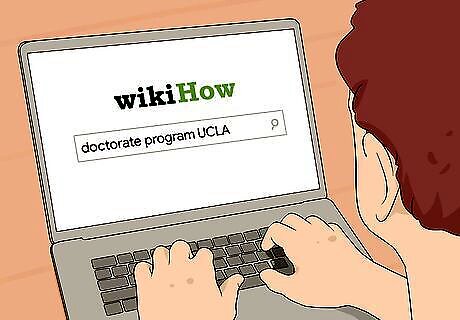
Apply for a doctorate program if you want to teach full-time at a university. Search for an accredited university or continue at the same one where you earned your master’s degree. As you earn your doctorate, you may be asked to help mentor or tutor younger nursing students to gain more experience as a CNE. Focus on your studies and do your best so you can earn the degree. You don’t need a doctorate to be a CNE, it can make you look better on a resume so you’re more likely to get hired.
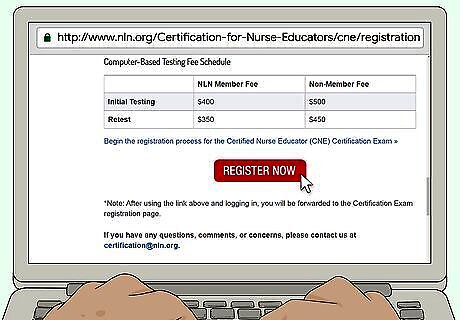
Take the Certification for Nurse Educators exam to look more qualified. While you don’t need the Certification for Nurse Educators to find a position, it will make you more competitive when you apply. Fill out the exam application on the National League of Nursing website and wait to receive an email back confirming your eligibility. Then schedule the exam within 90 days of your confirmation and pay the $500 USD fee. If you pass the exam, you’ll receive your certification in the mail within 6–8 weeks. You can register for the certification exam here: http://www.nln.org/Certification-for-Nurse-Educators/cne/registration. The subjects and number of questions on the test vary, but you can find the current ones listed on the exam website along with study guides.

Go to continuing education courses to stay up to date on medical practices. Nurses usually need to attend lectures, conferences, or seminars every 2 years to learn about breakthroughs in medicine and patient care. Look for nursing-related events in your field and attend them to ensure that your license stays active. Take notes during the events so you can remember what you’ve learned. Nursing events are also great opportunities to network with clinics and medical professionals that could offer you positions.
Developing Nursing and Teaching Skills

Work as a registered nurse for 3–5 years to gain experience in the field. After you earn your license, take time to work in the field and assist patients at a clinic. While you’re at the position, talk to your supervisor about any mentoring opportunities in the clinic so you can assist other nurses and help them learn more. Continue working at clinics for a minimum of 3 years so you’ll be considered for positions at schools. Many instructor positions require at least 3 years of experience as a registered nurse.

Pay attention to details to help you provide the best care. Try to limit the number of distractions around you so you don’t lose focus on the task that you need to do. Take notes while you’re observing something so you can stay organized. If you have trouble remembering things that you need to do or what to pay attention to, make checklists for every step of the process. Go through the checklist each time you do the activity so it develops into a regular habit. CNEs need to observe their students as they’re working and take detailed notes about patient care to ensure everything is done properly.

Communicate clearly during conversation and in documentation. Avoid speaking quickly or getting distracted while you’re talking since other people may not understand you as well. Take time to think about what you want to say and use the simplest language to convey the information. Speak slowly with a loud enough voice so the other person can hear you without any confusion. If you’re writing things down, make sure your penmanship is legible and easy yo read. Try to answer any questions as completely as you can so there aren’t any miscommunications. Nursing instructors need to instruct their students what to do as well as communicate to patients about their condition and any procedures they need. Maintain a professional tone when you communicate so other people take you seriously.Tip: Make sure any writing, such as patient notes or paperwork, is clear and concise so people don’t get confused in case you aren’t present to explain what you meant.

Conquer any fears of public speaking so you can teach large groups. Always practice or go over notes before each lesson so you feel more prepared. Try to arrive at least 15 minutes early so you don’t feel rushed. Stand up straight and take deep breaths to help you stay more relaxed. Speak in a slow, calm voice that’s loud enough for everyone to hear. Pick spots in the audience to look at while you present so you can seem more engaging. CNEs need to present lessons and teach classes of nurses and you may have large classes.

Keep documents and files organized so you don’t mix up information. Keep any work or personal spaces tidy so you can easily find things without looking for too long. Sort any files or documents you have into separate folders so you know where to access them when you need them. If you need to, create labels so you can locate items at a glance and so you know where to keep them in the future. Nursing instructors have to manage paperwork, syllabuses, and student work to ensure that the students are taught properly and patient needs are taken care of. Use folders and organizers to help you sort through items and papers easier.

Show compassion for others so you can connect with them easier. When you talk to other people, maintain eye contact with them and smile frequently to show that you care about them. Use a soft tone of voice while you’re speaking, and listen to others without interrupting them. Treat everyone you meet fairly and validate their concerns or feelings to show that you’re empathizing with them. Compassion can help CNEs seem more approachable to their students and patients so they’re more likely to communicate with you.
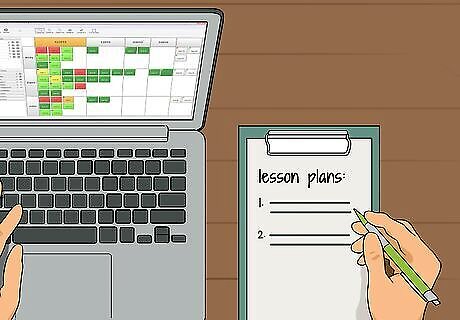
Practice designing lesson plans so you can write curricula. Consider what the most relevant information that students need to know and be sure to include it in your lesson plan. Make sure that the processes that you teach build on top of one another, meaning you start with the simplest ideas and continue introducing ones that are more complex. With each lesson, plan activities or work for students to complete to help them learn the concepts even more. When you’re hired as a nursing instructor, you will work with other faculty members to help develop the curriculum, so you won’t have to do it entirely on your own. You will also learn how to develop a curriculum from your college nursing program.

Try tutoring or mentoring so you can practice interacting with students. Look for tutoring or mentorship programs in your area so you can gain experience assisting others with their needs. Ask the people you tutor about their concerns and what they would like to work on so you can address them. Keep open communication with the other person so they feel comfortable asking questions and talking with you. Clinical instructors need to teach students proper procedures and care in order to treat their patients correctly. Try looking for after-school programs to help students with coursework so you can practice teaching academics. You may be able to volunteer at a hospital or clinic so you’re working in the medical field. Contact your local clinic to see if there are any volunteer positions available.
Finding an Instructor Position
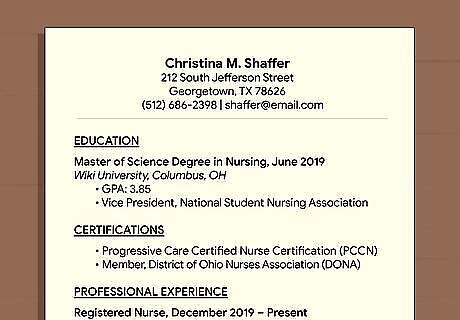
Create a resume or CV that lists your specialties and experience. Be sure to list all of your credentials and your education history on your resume or CV to show off your experience. Include all of the positions you’ve worked in clinics, what duties you performed on the job, and how long you held the position. You can also include research you’ve done or any continuing education courses you’ve taken to show that you’re more qualified. Keep resumes and CVs to 1–2 pages so they aren’t overwhelming to look at. Organize the resume or CV with bullet points rather than writing long paragraphs. That way, it will look more organized and information is easy to find. Never lie about the information on your resume.

Apply for instructor positions at nursing schools that interest you. Contact any universities that you’re interested in to see if they have any educator positions available. Start by seeing if they have any part-time roles since you may be more likely to get them than full-time positions right away. Fill out the applications for each university in full and submit them with your resume or CV. Continue searching and applying for jobs so you have options to choose from if you get multiple offers. Talk to educators that you’ve had in the past to see if there are opportunities at the nursing schools you’ve attended. Your past instructors may also know of other open positions they’ve heard about from colleagues.Tip: Offer to substitute teach at nearby clinics or nursing schools so you can gain experience while you’re looking for a full-time position.

Search on nursing job boards if you want to broaden your search. Look at the websites for the National League of Nursing or the American Association of Colleges of Nursing to see what faculty openings they have listed. Look at each of the job postings to determine if you meet the required qualifications and research the school to see if you’d be a good fit. Submit an application along with your resume or CV to any positions that you’re interested in. You may also be able to find positions on standard job boards, such as LinkedIn or Indeed.

Interview with the school’s dean and other faculty members. Dress professionally and arrive at least 15 minutes earlier than the scheduled time to show you’re punctual. Maintain a friendly and personable tone while you’re interviewing so you leave a good impression. Answer any of the interview questions truthfully and to the best of your ability. Thank the dean for the interview regardless of how it went and let them know you hope to hear from them soon. You may also need to interview with other clinical instructors to ensure you’re a good fit.
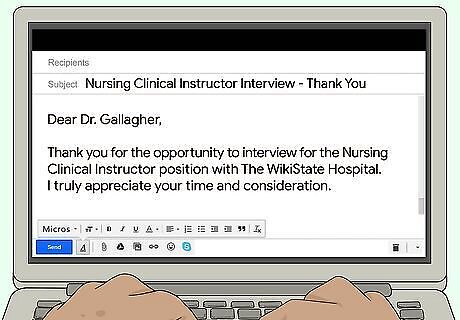
Follow up with an email after your interview to seem more driven for the position. Within 1 week of the interview, send a thank you email to the dean or anyone you interviewed with to show your gratitude. Address them by their name and reference any specific conversations that you had to refresh their memories. At the end of the email, ask if there are any updates and that you look forward to hearing back from them. The university will be interviewing many candidates, so it may take some time for the dean to make a decision about who they want to hire. Maintain a friendly tone so you don’t sound too pushy or bossy in your email.




















Comments
0 comment